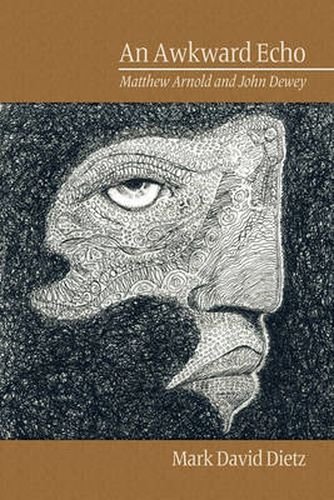Readings Newsletter
Become a Readings Member to make your shopping experience even easier.
Sign in or sign up for free!
You’re not far away from qualifying for FREE standard shipping within Australia
You’ve qualified for FREE standard shipping within Australia
The cart is loading…






This title is printed to order. This book may have been self-published. If so, we cannot guarantee the quality of the content. In the main most books will have gone through the editing process however some may not. We therefore suggest that you be aware of this before ordering this book. If in doubt check either the author or publisher’s details as we are unable to accept any returns unless they are faulty. Please contact us if you have any questions.
Matthew Arnold, 19th century English poet, literary critic and school inspector, felt that each age had to determine that philosophy that was most adequate to its own concerns and contexts. This study looks at the influence that Matthew Arnold had on John Dewey and attempts to fashion a philosophy of education that is adequate for our own peculiarly awkward age. Today, Arnold and Dewey are embraced by opposing political positions. Arnold, as the apostle of culture, is often advocated by conservative educators who see in him a support for an education founded on great books and Victorian values, while Dewey still has a notably liberal coloring and is not too infrequently tarred for the excesses of progressive education, even those for which he bears no responsibility at all. Both, no doubt, are misread by those who rather carelessly use them as idols for their own politics of education. This study proposes a pluralistic approach to education in which pluralism means not only plurality of voices, but also plurality of processes. Using a model built out of a study of rhetoric and hermeneutics, four aspects of mind are indentified that draw Arnold and Dewey into close correspondence. These aspects are the tentacle mind (using Dewey’s favorite metaphor for breaking down the barrier between mind and body), the critical mind (which builds on the concepts of criticism that animated both Arnold and Dewey’s approach to experience), the intentional mind (which attempts a long overdue rehabilitation of the concept of authority and an expansion upon the increasingly apparent limitations of reader-response theory) and the reflective-response mind (in which the contemplative mind is treated to that active quality that makes it more a true instrumentality and less an obscuring mechanism of isolation). Dewey echoed Matthew Arnold who himself echoed so many of the voices that preceded and were contemporary with his own. Theirs were awkward echoes, as all such echoes invariably are. They caught at the intentionality of those voices they echoed, trying for nearness, but hoping, at least, for adequacy. Awkward, but adequate, is what this study offers, but it may well be what we most need right now.
$9.00 standard shipping within Australia
FREE standard shipping within Australia for orders over $100.00
Express & International shipping calculated at checkout
This title is printed to order. This book may have been self-published. If so, we cannot guarantee the quality of the content. In the main most books will have gone through the editing process however some may not. We therefore suggest that you be aware of this before ordering this book. If in doubt check either the author or publisher’s details as we are unable to accept any returns unless they are faulty. Please contact us if you have any questions.
Matthew Arnold, 19th century English poet, literary critic and school inspector, felt that each age had to determine that philosophy that was most adequate to its own concerns and contexts. This study looks at the influence that Matthew Arnold had on John Dewey and attempts to fashion a philosophy of education that is adequate for our own peculiarly awkward age. Today, Arnold and Dewey are embraced by opposing political positions. Arnold, as the apostle of culture, is often advocated by conservative educators who see in him a support for an education founded on great books and Victorian values, while Dewey still has a notably liberal coloring and is not too infrequently tarred for the excesses of progressive education, even those for which he bears no responsibility at all. Both, no doubt, are misread by those who rather carelessly use them as idols for their own politics of education. This study proposes a pluralistic approach to education in which pluralism means not only plurality of voices, but also plurality of processes. Using a model built out of a study of rhetoric and hermeneutics, four aspects of mind are indentified that draw Arnold and Dewey into close correspondence. These aspects are the tentacle mind (using Dewey’s favorite metaphor for breaking down the barrier between mind and body), the critical mind (which builds on the concepts of criticism that animated both Arnold and Dewey’s approach to experience), the intentional mind (which attempts a long overdue rehabilitation of the concept of authority and an expansion upon the increasingly apparent limitations of reader-response theory) and the reflective-response mind (in which the contemplative mind is treated to that active quality that makes it more a true instrumentality and less an obscuring mechanism of isolation). Dewey echoed Matthew Arnold who himself echoed so many of the voices that preceded and were contemporary with his own. Theirs were awkward echoes, as all such echoes invariably are. They caught at the intentionality of those voices they echoed, trying for nearness, but hoping, at least, for adequacy. Awkward, but adequate, is what this study offers, but it may well be what we most need right now.